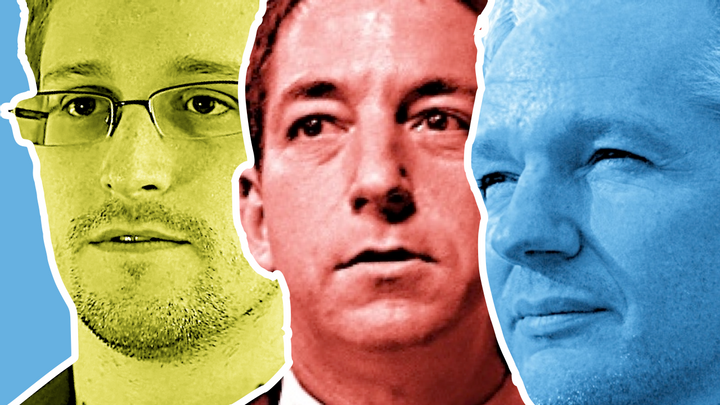What do they really believe — and does it even matter?
– Caitlin Moniz
Understanding the real motives of Edward Snowden, Glenn Greenwald, and Julian Assange.
Edward Snowden, Glenn Greenwald, and Julian Assange have all been lauded as heroes for leaking secret government information. The media has deemed them champions of the cause against “tyrannical secrecy,” but is that actually what drives them? How much does motivation matter?
Sean Wilentz, editor at The New Republic and history professor at Princeton University, writes that Snowden, Greewnald, and Assange do not “deserve the prestige and influence that has been accorded to them.” After delving into old documents and blog posts from each, Wilentz finds agendas that are far from transparent, “in which one can glimpse their deepest beliefs and true motives.”
There is, says Wilentz, a fundamental difference between admirers and the leakers themselves that the media has yet to recognize — a failure to consider more critically the motives of Snowden, Greenwald, and Assange, whose ideologies are not often aligned with those who regard them so highly; “The champions of ‘transparency’ have been remarkably opaque when they choose to be,” writes Wilentz.
Edward Snowden, high school dropout at age 16, began regularly posting in public chat rooms under the username “TheTrueHOOHA.” In 2007, he was posted to Geneva, working as an I.T. security specialist for the CIA. Over time, his chat room posts became increasingly political. “In 2009,” notes Wilentz, “Snowden lambasted The New York Times and its anonymous sources for exposing a secret Bush administration operation to sabotage Iran’s nuclear capabilities.” By Snowden's own account, however, he “began having serious misgivings about the Bush-era surveillance” in 2007, when he started work in Geneva. Legal expert and Ars Technica editor Joe Mullin, upon investigating Snowden’s posts in his site’s chat room, declared that “the Snowden seen in these chats is not the man we see today.” Wilentz questions Snowden’s trustworthiness, noting that many of the documents he accessed were found via the logins and passwords of co-workers — which he obtained by lying that he needed the files to do his job as a computer systems administrator. By 2013, Snowden had stolen around two million files from the NSA, releasing documents to a more sophisticated political operator: Glenn Greenwald.
As a practicing attorney in the mid-1990s, Glenn Greenwald took on the pro bono defense cases of political extremists like the neo-Nazi National Alliance of Long Island, and white-supremacist leader Matthew Hale. In 2005, Greenwald made the transition from lawyer to blogger, launching the blog site Unclaimed Territory, focusing on national security, civil liberties, intelligence policy, and media criticism (which have been Greenwald’s passions as a writer ever since). Greenwald was, writes Wilentz, “in a peculiar corner of the political forest, where the far left meets the far right, often but not always under the rubric of libertarianism.” In 2010, Greenwald made contact with Julian Assange, founder of WikiLeaks. This collaboration with Assange, claims Wilentz, allowes Greenwald “not simply to criticize the national security state, but to sabotage it.”
Julian Assange, raised in 1970s Australia, was a talented hacker by the age of 16. His being charged with 31 hacking and related crimes in 1994 contributed to his disavowal of authority seen in his more recent manifestos. In 2006, Assange founded WikiLeaks, intended to combat authoritarian power with the release of government secrets (an intention that Assange acted upon with, among other efforts, the release of more than a quarter-million U.S. diplomatic cables). By 2012, “Assange had acquired something like Russian government media sponsorship,” Wilentz writes — a relationship Assange may have used to assure Snowden's temporary asylum in the country.
Unlike these characters, says Wilentz, the public may find fault in invasive NSA programs, but it views such programs as things to be corrected, not abolished. In Wilentz's words, the leakers “are aiming at de-legitimating and, if possible, destroying something much larger than a set of NSA programs. To them, national security is not a branch of the government; it is the government, or it is tantamount to being the government: a sinister, power-mad authority.” Snowden, Greenwald, and Assange have an “animating belief that the United States is an imperial power, drunk on its hegemonic ambitions.”
That “Snowden, Greenwald, and Assange have largely set the terms in the debate over transparency and privacy in America” is, to Wilentz, a shame; by legitimizing, sanctioning, or celebrating Snowden, Greenwald, and Assange, we are assenting to — endorsing, even — their motives.
The Source: “Would You Feel Differently About Snowden, Greenwald, and Assange If You Knew What They Really Thought?,” by Sean Wilentz. The New Republic, January 19, 2014.
Photo courtesy of Wikimedia Commons
